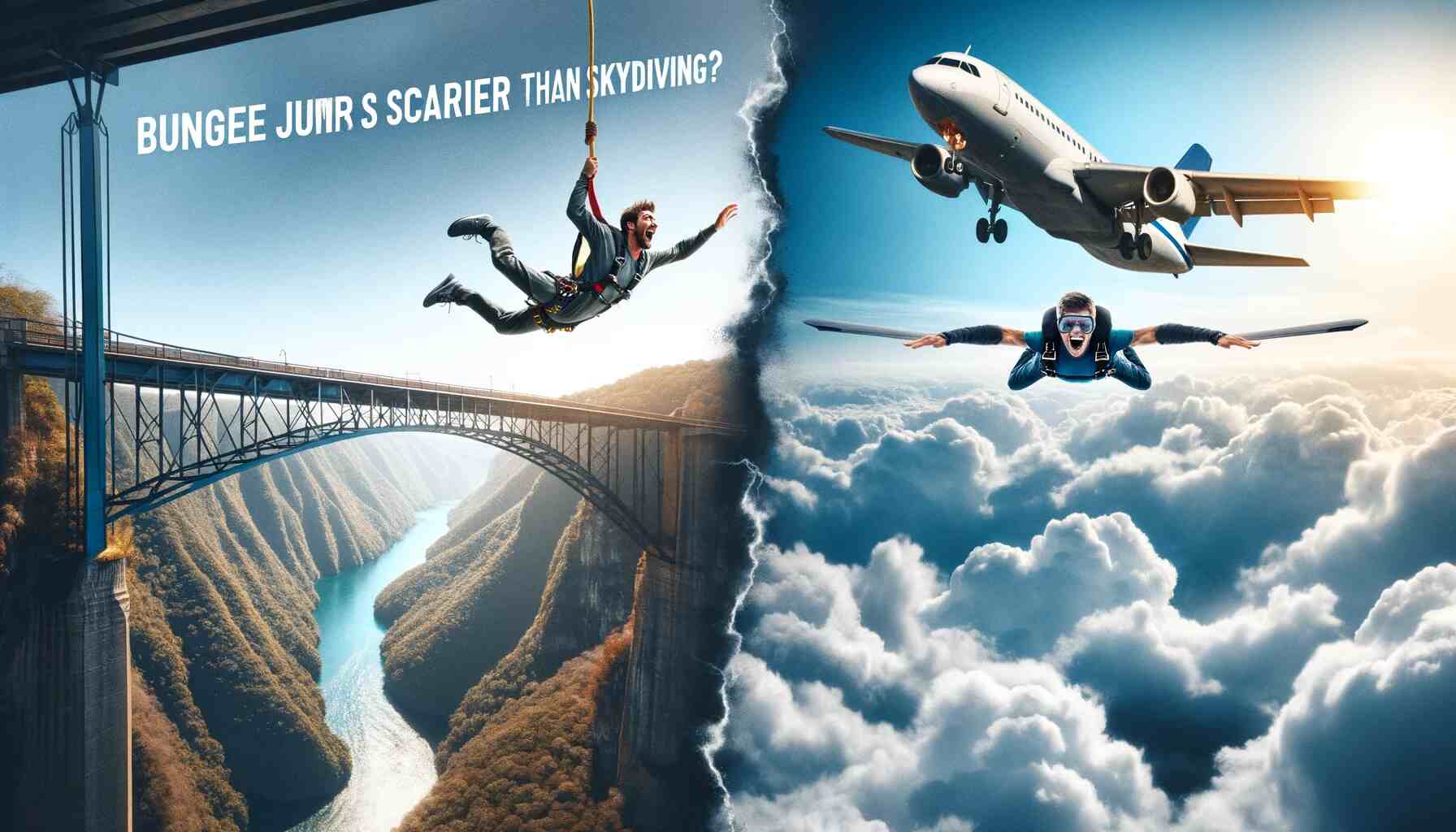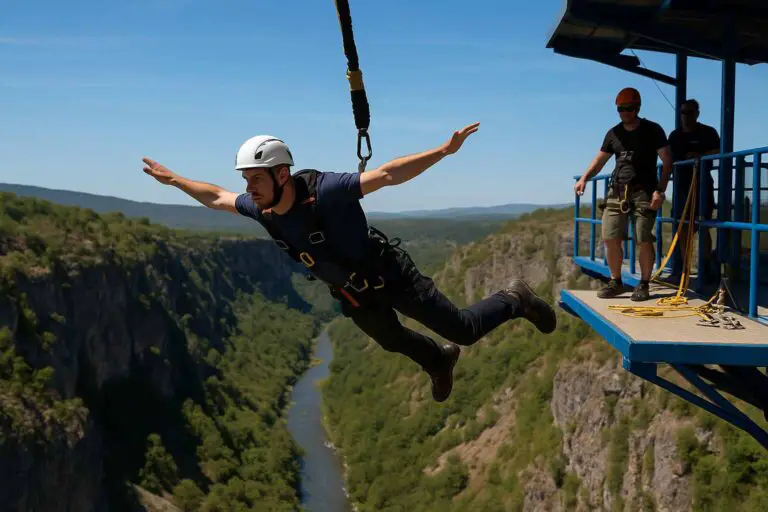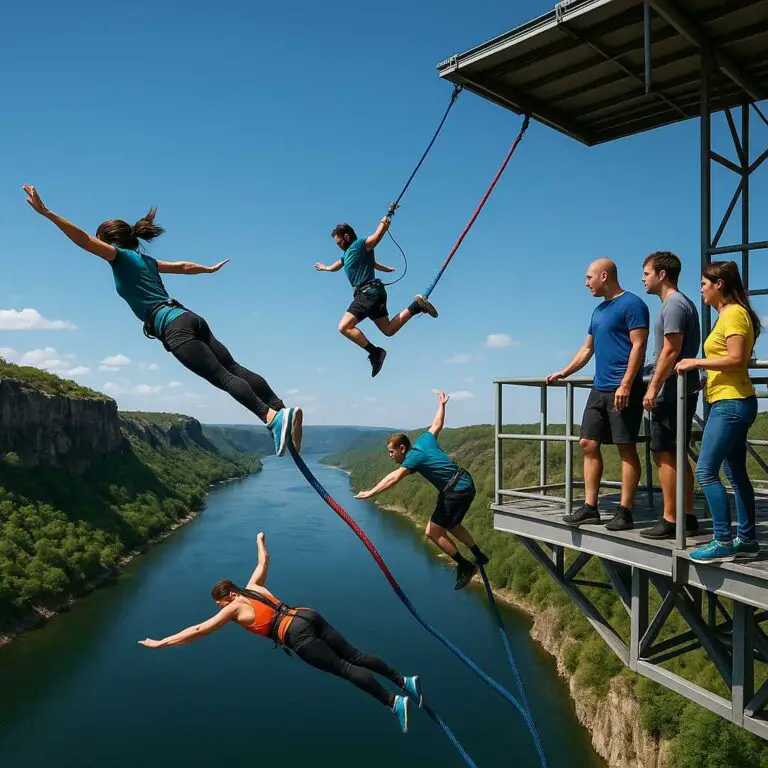Adrenaline junkies and thrill-seekers around the world often find themselves debating the merits of various extreme activities. Among these debates, the comparison between bungee jumping and skydiving frequently arises. Both activities offer an exhilarating rush of adrenaline and a breathtaking view from high above the ground, but the question remains: Is bungee jumping scarier than skydiving?
Whether bungee jumping is scarier than skydiving varies from person to person. Bungee jumping brings an instant, intense fear as you drop, whereas skydiving builds fear more gradually during a longer freefall. The scariness depends on individual preferences and how well you handle fear.
In this article, we will delve into the world of bungee jumping and skydiving to explore the risks, the psychological factors, and the overall experience of each activity to help you make an informed decision about which one might be scarier, or more thrilling, for you.
Understanding the Basics: Bungee Jumping
Bungee jumping is a thrilling adventure sport that involves jumping off a high platform or bridge with a secure bungee cord tied around your ankles. The cord stretches and recoils, allowing you to experience a freefall sensation before it stops your descent just above the ground or water. While it might seem straightforward, the experience of bungee jumping is anything but ordinary.
1. The Fear Factor in Bungee Jumping
When it comes to evaluating whether bungee jumping is scarier than skydiving, it’s essential to consider the fear factor involved in each activity. In bungee jumping, the fear is more immediate and intense. As you stand on the edge, gazing down at the abyss below, your heart races, and your mind battles with the primal fear of falling to your doom. The adrenaline surge is instantaneous, and the fear is palpable.
One of the reasons bungee jumping can be particularly terrifying is that you are fully aware of the height you’re jumping from and the ground rapidly approaching. This heightened sense of awareness can make the experience feel scarier to some individuals, especially those with a fear of heights.
2. The Psychological Impact of Bungee Jumping
Psychologically, bungee jumping can be a rollercoaster of emotions. The anticipation leading up to the jump, the gut-wrenching moment when you take the plunge, and the euphoria that follows once the cord recoils and you’re safely suspended above the ground can be emotionally intense. The fear, followed by the relief, creates a unique psychological journey that leaves a lasting impression.
Moreover, the fear of bungee jumping often stems from the perceived risk of the bungee cord breaking or malfunctioning. While reputable bungee jumping operators ensure safety through rigorous inspections and high-quality equipment, the mere thought of something going wrong can heighten the fear factor.
3. The Duration of Fear in Bungee Jumping
Another aspect to consider is the duration of fear experienced in bungee jumping. The intense fear and adrenaline rush are relatively short-lived, usually lasting only for the few seconds it takes to freefall and before the cord recoils. Once you’re suspended in the air, the fear tends to dissipate, replaced by a sense of euphoria and exhilaration.
This relatively short-lived fear can be both a pro and a con, depending on your perspective. Some people might prefer the idea of a brief but intense scare, while others may find it less daunting than a prolonged experience.
Understanding the Basics: Skydiving
Skydiving is another extreme activity that involves jumping from an aircraft at high altitudes and freefalling before deploying a parachute to slow down and safely land on the ground. Skydiving is often considered one of the ultimate thrill-seeking experiences, and it offers a unique set of challenges and emotions.
1. The Fear Factor in Skydiving
In skydiving, the fear factor is present but differs from that of bungee jumping. When you exit an aircraft from thousands of feet in the air, you initially experience a sense of weightlessness as you plummet towards the Earth. This sensation of freefall can be both exhilarating and intimidating.
The fear in skydiving is more prolonged than in bungee jumping. During freefall, you have a longer period to acclimate to the height and speed, and this can lead to a more gradual buildup of fear. However, some people find that the anticipation leading up to the jump, particularly in the moments before exiting the plane, can be especially nerve-wracking.
2. The Psychological Impact of Skydiving
Skydiving can be psychologically demanding due to the extended freefall period. As you descend from the sky, your mind has more time to process the experience, which can lead to a mix of emotions. Some people feel intense fear initially, which transforms into a sense of liberation and awe as the parachute opens and they glide safely to the ground.
Additionally, skydiving often requires participants to overcome their fear of heights and trust in the equipment and the training they’ve received. This mental challenge can be a significant part of the overall skydiving experience, as it forces individuals to confront and conquer their fears.
3. The Duration of Fear in Skydiving
Compared to bungee jumping, skydiving offers a longer duration of fear and excitement. The entire skydiving experience, from exiting the plane to landing on the ground, can last several minutes, depending on the altitude from which you jump. This extended period allows for a more profound immersion in the experience and a chance to fully appreciate the sensation of freefall.
However, this longer duration can also be more mentally taxing for some individuals. The fear and anxiety can intensify during the freefall, and it requires a level of mental fortitude to maintain composure and enjoy the experience fully.
Comparing the Fear Factors
Now that we’ve examined the fear factors involved in both bungee jumping and skydiving, let’s compare them side by side:
- Intensity of Fear:
- Bungee Jumping: Intense, immediate fear as you stand on the edge.
- Skydiving: Gradual buildup of fear during freefall, with initial anxiety before exiting the plane.
- Psychological Impact:
- Bungee Jumping: Emotionally intense due to quick transitions from fear to relief.
- Skydiving: Psychological challenge in overcoming fear of heights and trusting equipment.
- Duration of Fear:
- Bungee Jumping: Short-lived fear, lasting seconds.
- Skydiving: Prolonged fear, lasting minutes.
Ultimately, the scariness of each activity depends on individual preferences and tolerance for fear. Some may find the quick, intense fear of bungee jumping scarier, while others might be more comfortable with the gradual buildup of fear in skydiving. Now, let’s explore other factors that can influence your choice between these two thrilling experiences.
Safety Considerations
Safety is a paramount concern in both bungee jumping and skydiving. Operators in both industries adhere to strict safety protocols and regulations to minimize risks and ensure the well-being of participants. It’s essential to research and choose reputable operators with experienced staff and a history of safe operations.
In bungee jumping, the primary safety concern is the integrity of the bungee cord and equipment. Regular inspections, maintenance, and adherence to industry standards are essential to minimize the risk of equipment failure. Reputable bungee jumping operators prioritize safety and have an excellent safety record.
In skydiving, safety is achieved through rigorous training and equipment checks. Participants are required to complete a training program that covers safety procedures and parachute operation. Skydiving instructors accompany first-time jumpers to ensure a safe experience. Modern parachute equipment is designed to be highly reliable, with redundant safety mechanisms.
Also, contrary to common belief, skydiving is not as risky as it seems. With rigorous safety measures, including dual parachute systems and the presence of a certified instructor, the chances of an accident are remarkably low. In fact, statistics from the United States Parachute Association indicate that the chance of dying while skydiving is only 0.00028 percent.
While both activities have safety measures in place, it’s crucial for participants to follow instructions, ask questions, and feel confident in the operator’s commitment to safety.
Physical Requirements
Both bungee jumping and skydiving have specific physical requirements that participants should be aware of:
- Bungee Jumping:
- Generally, bungee jumping is accessible to a wide range of individuals, including those with limited physical fitness.
- Participants should be in reasonably good health, with no underlying medical conditions that could be exacerbated by the experience.
- Weight restrictions may apply, as the bungee cord’s elasticity is calibrated based on the participant’s weight.
- Skydiving:
- Skydiving may have slightly stricter physical requirements.
- Participants should be in good general health and free from medical conditions that could pose a risk during the jump.
- Weight restrictions may also apply due to equipment limitations and safety concerns.
It’s important to check with the specific bungee jumping or skydiving operator regarding their physical requirements to ensure that you are eligible to participate.
Cost Considerations
Cost is another factor to consider when deciding between bungee jumping and skydiving:
- Bungee Jumping:
- Bungee jumping is often less expensive than skydiving. Prices can vary depending on the location and height of the jump, but it is generally more budget-friendly.
- Many bungee jumping operators offer package deals or group rates, making it an accessible option for those on a tighter budget.
- Skydiving:
- Skydiving tends to be more expensive than bungee jumping due to the cost of aircraft operations, training, and equipment.
- The price can vary significantly depending on the altitude of the jump and the location.
While skydiving may be more expensive, many participants find it to be a once-in-a-lifetime experience that justifies the cost.
The Thrill of a Lifetime
In the debate over whether bungee jumping is scarier than skydiving, it’s essential to remember that both activities offer a thrill of a lifetime. The fear factor, safety considerations, and physical requirements should all be weighed against your personal preferences and comfort levels.
For some, the quick and intense rush of bungee jumping is the ultimate thrill, while others prefer the extended freefall and breathtaking views of skydiving. Whichever you choose, both activities provide a unique opportunity to conquer fear, push your boundaries, and experience an adrenaline rush like no other.
Conclusion
In conclusion, skydiving and bungee jumping are both categorized as extreme sports. However, you might feel more secure during a skydiving experience. Specifically, when you undertake a tandem skydive, you’re accompanied by a professional instructor who is both licensed and certified.
Is bungee jumping scarier than skydiving? The answer ultimately depends on your perspective and individual preferences. Bungee jumping offers an immediate, intense fear with a shorter duration, while skydiving provides a gradual buildup of fear during a more extended freefall experience. Both activities prioritize safety and require participants to meet certain physical requirements.
Whether you opt for bungee jumping or skydiving, both offer exhilaration, a sense of accomplishment, and memories that will last a lifetime. The decision comes down to what type of thrill you seek, the duration of the experience you desire, and your comfort level with heights and fear. Whichever you choose, prepare for an adventure that will leave you with a newfound appreciation for the exhilaration of defying gravity.








